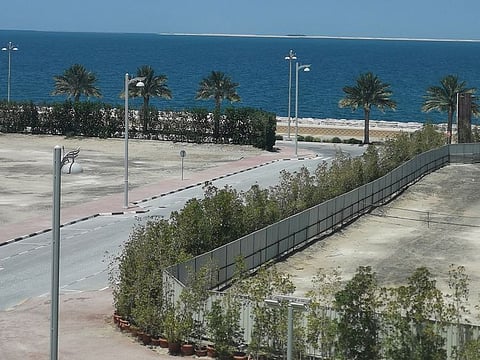COVID-19: How UAE hotels have turned into quarantine facilities
Hospitality sector joins hands with DHA to isolate patients with mild or no symptoms

DUBAI: Many empty hotels in the UAE have now been transformed into quarantine facilities for asymptomatic and mildly-symptomatic coronavirus patients. This collaboration between the hospitality industry and the healthcare sector have helped free up hospital beds for those who need them the most, while successfully isolating the ones who wait for their results to be declared completely virus-free.
It has also helped to add an extra level of protection for the community and the families of these patients who might have risked their own health by having them close at home.

Abdulla Balouma, Director of General Services and Administration Affairs at DHA, said, “We are working with different hotels and many private healthcare providers to ensure we have high-quality isolation facilities for people that need to undergo mandatory self-isolation for a period until deemed medically fit. Working with hotels for isolation purposes has multiple benefits. It reduces the risk of infection spread and thus protects community members, it also provides those who need to self-isolate with a comfortable and comforting environment and it ensures hospital beds are reserved for those who really need them.”

Dr Pietie Loubser, Chief Clinical Officer, Mediclinic Middle East, that manages one such hotel in Dubai, said, “As you are aware, the UAE Government is employing many strategies in its efforts to control the Covid-19 pandemic. One such measure is to utilise currently empty hospitality facilities to quarantine asymptomatic COVID-19 sufferers or those who are recovering from the virus and need minimal care. Mediclinic is actively supporting the Government in this endeavour by managing such a facility. Those in residence receive a high level of care and support.”
No hospitality staff
The hotels that have been transformed into quarantine facilities are manned entirely by healthcare staff. There are no employees of the hotel on ground. Patients have to be above 18 and under 50, displaying mild symptoms or with no symptoms at all, to be able to be in residence. Each patient has a private room, with access to three meals a day, free wifi and laundry services. Nurses and doctors check vitals daily, keep an eye out for any developing symptoms and check for headaches.

Vernon Cordy, Clinic Director, Mediclinic Dubai Mall, explained that when patients come in to the quarantine facilities, they are, “tested five days after admission. If the first test is negative, a second test will be conducted after 24 hours. If it is negative again, the patient will be discharged. If, however, the test is positive, the test will be repeated after 72 hours and will be repeated until two successive negative results (24 hours apart) are obtained.”
Six-night stay
Suman Manning, who tested positive for Coronavirus in March but remained totally asymptomatic, spent six nights in one such quarantine facility on The Palm Jumeirah. She is now all clear of the virus.
Manning was moved from her home to the Parkview Hospital to be checked after testing positive for the second time and then from the hospital, was moved to the hotel on April 8. She has remained completely asymptomatic all this while.
The hotel Manning was quarantined at has no hospitality staff and is manned by the Mediclinic nurses and doctors. “We were well looked after. We each had a room with a balcony and I even had a view of the ocean! We get served three meals and two snacks a day. We were also allowed to order food online which then got delivered to the hotel and one of the staff brought it up to me. It was all contactless. We were also provided with a choice of cuisines. The authorities also make sure we had access to fresh towels and toiletries and we had help with laundry as well.”
High level of safety controls
So, how does a hotel get transformed into a quarantine facility? Balouma says that DHA is working with hotels to create the highest level of safety controls and an environment, which is healing for patients.
“We create positive pressure in the corridors and negative pressure in the patient rooms using the hotel’s AC system and increase circulation of fresh air in the rooms. We work closely with hotels and the private health providers so that hotels follow all health precaution measures to the highest standards and they are monitored by DHA. Hotel staff undergo training prior to the process of taking in any patients and they follow all disinfection protocols and processes.
We provide all staff members at the hotel with necessary personal protective equipment (PPE’s) and they thoroughly follow health and safety guidelines. Those under self-isolation are also made aware of these procedures. For example, food and change of linen is placed outside the door, patients need to wear a facemask when they collect the food. Disposal methods are clearly explained to patients. Patients have wi-fi facility and are provided with customized regular meals especially prepared based on their preference and medical conditions.”
Cordy, who has been managing operations at the quarantine facility of The Palm, agrees that the change in done in keeping with international standards.
“Process flows are instituted whereby contaminated items are separated from clean areas. While rooms are kept as comfortable as possible, all items that are considered non-essential or pose an infection control risk are removed. It is important to ensure adequate room ventilation and to post signage indicating isolation areas. No visitors are allowed and access to and movement within the hotel is restricted.”
Even staffing is in accordance with DHA regulations and international norms.
“Frequently used ratios are 1:10 for nursing (one nurse for 10 patients) and 1:40 doctors. There are, however, environmental and other factors that might influence these ratios, such as the layout of rooms on a particular floor,” Cordy added.







